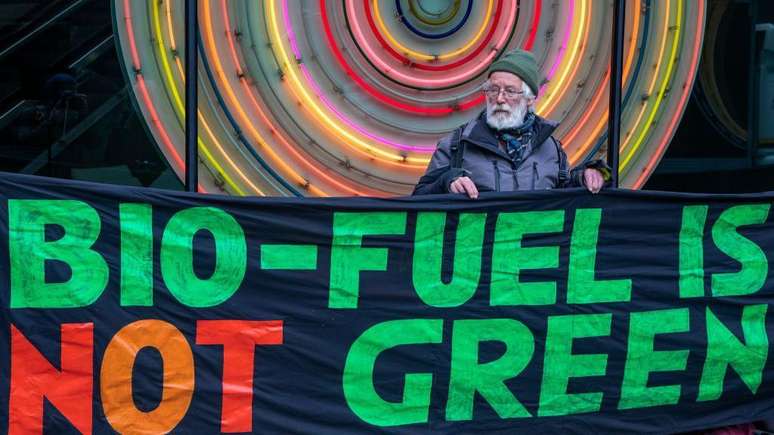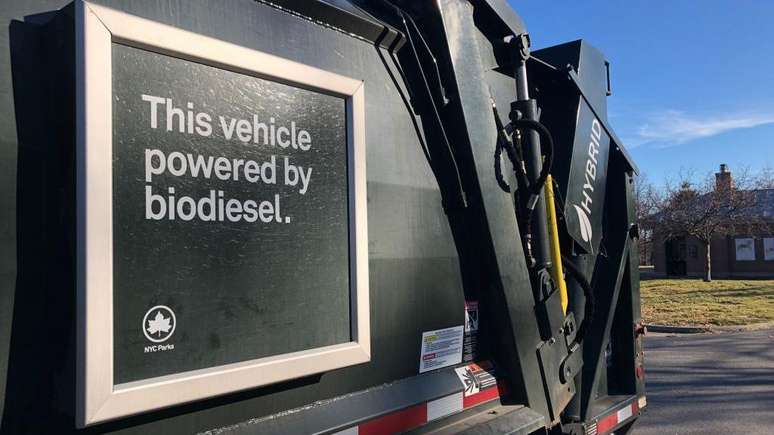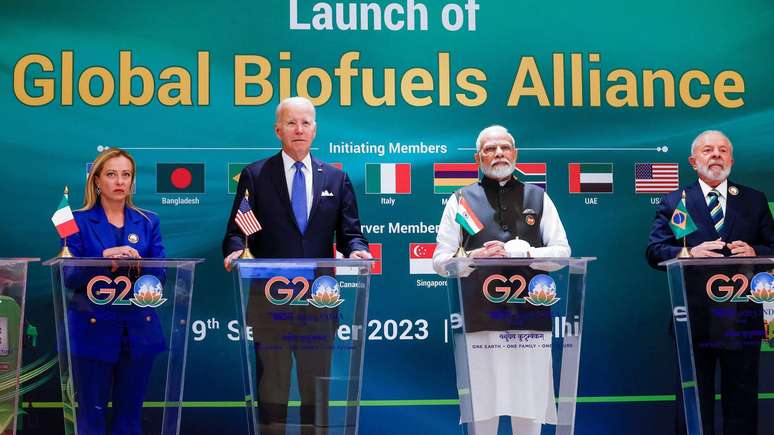Brazil, India and the United States are leading a new effort to expand consumption of fuels like ethanol.
The Global Biofuels Alliance was launched this Saturday (9/9) during the G20 summit in New Delhi, led by Brazil, the United States and India, the three largest producers in this field.
The initiative, which includes more than 16 countries, aims to promote the production and consumption of fuels such as ethanol around the world, especially in developing economies of the Global South, as part of an energy transition agenda towards less polluting sources.
The initiative has been appreciated by Itamaraty and the Brazilian private sector, who believe that the potential of biofuels has been underestimated, compared to other more expensive options, such as electric cars.
“It’s like it’s a bastard energy and now it’s getting a seal of approval,” a diplomat tracking the topic told BBC News Brasil.
Historically, criticism has mainly come from European countries, which question how sustainable biofuels really are.
Deforestation to open new fields of plantations and the occupation of land used for food production are factors identified as problems in this production.
Defenders of the new alliance say that it aims, in fact, to promote the sustainable production of biofuels, with the sharing of knowledge and technologies from countries such as Brazil, and the use of already deforested land.
An acceptable Brazilian initiative, according to Itamaraty sources, is RenovaBio, a program created by the Ministry of Mines and Energy in 2016 which certifies the production of biofuels based on the reduction of greenhouse gas emissions, allowing producers to exchange carbon credits .
According to these diplomats, the historical resistance of European countries against biofuels, generally justified by concerns about deforestation, is also linked to these countries’ interest in selling their technologies, such as electric cars.
President Luiz Inácio Lula da Silva attended the launch ceremony alongside US President Joe Biden and Indian Prime Minister Narendra Modi, but there were no speeches due to the summit’s busy agenda.
“Today, the present need is for all countries to work together in the field of fuel blending. Our proposal is to take a global initiative to bring ethanol and petrol blending up to 20%,” Modi said, at another time of the dome.
In Brazil, gasoline already contains 27.5% ethanol in its blend and the government is considering increasing this percentage to 30%.

Market growth will generate business for Brazil
The idea of the alliance is for biofuels to be used globally, not only in automotive transport, but also in airplanes and boats.
The International Civil Aviation Organization has already adopted ambitious targets for reducing carbon emissions that will come into force in 2027, while the maritime sector is finalizing the process to do so.
Liquid biofuels already account for a fifth (around 20%) of transport energy consumption in Brazil, but this percentage is only 4% globally.
According to the International Energy Agency, global production must triple by 2030 for the world to achieve net-zero carbon emissions by 2050.
A more robust global market could bring business to Brazil, which is a leader in the production of ethanol from sugarcane and will be able to export flex-fuel cars (powered by petrol and ethanol) and technology, explains Plinio Nastari, president of Datagro Consultoria and member of the National Council for Energy Policies.
“The world will produce more, it will need equipment. What is the world’s largest producer of ethanol production equipment? It’s Brazil,” he told the reporter.
Nastari agrees that biofuels have long been treated as a “bastard” energy. He points out that more modern uses of this energy are being developed, such as its application in hydrogen-powered cars.
“Being a carrier of hydrogen, ethanol allows hydrogen to be distributed in the form of liquid fuel, in a practical, economical and safe way. And the transformation of this liquid ethanol fuel into hydrogen occurs at the moment of consumption,” he explained.
“Hydrogen has a very concentrated energy content. Therefore, the efficiency of hydrogen engines is very high. We could have a car that can travel 25 kilometers on one liter of ethanol, but the ethanol in the form of hydrogen, not under form of fuel. While today cars that use (conventional) ethanol travel eight, eleven, fourteen kilometers with one liter, in the case of hybrids”, explains Nastari.

Alternative for the South of the world
The attempt to expand the global ethanol market is a long-standing agenda of Itamaraty and the Brazilian private sector, led by Unica (União da Indústria de Cana de Açúcar).
In his second presidential term, Lula signed an agreement with US President George W. Bush in 2007, aiming to promote biofuels around the world, but progress has been timid.
At that time Bush even called Lula “the evangelist of ethanol”, due to the Brazilian’s strong campaign in favor of this energy option.
For Itamaraty, the alliance signed in India is an initiative that fits perfectly with the objectives of Brazilian foreign policy of promoting the development of the Global South.
This is because the adoption of biofuels is considered a sustainable and cheaper energy alternative for transport than, for example, fleet electrification. Furthermore, it is also labor intensive and can generate more jobs and income.
Ethanol, the Indian bet with a Brazilian touch
Brazil is the second largest producer of biofuels in the world, behind the United States.
India recently became the third largest country after the Modi government invested more in this energy option, a process that had the support of the Brazilian government and the private sector through cooperative agreements.
Because of the speed of progress, the country even brought forward its goal of adding 20% ethanol to gasoline from 2030 to 2025, after reaching last year’s 10% goal early.
India is a major producer of sugarcane (one of the raw materials for ethanol) and is also the largest oil importer in the world. Therefore, expanding the use of biofuels has become an important asset for the country’s energy security and foreign exchange savings.
“What this global alliance will do will be to build a process of cooperation so that the processes of adopting bioenergy as a substitute for fossil energy sources are accelerated”, explains the president of Única, Evandro Gussi, in the report.
“This idea comes from a concrete example: what the public and private sectors of Brazil have done with India in recent years is to share our experience in the production of bioenergy, especially ethanol,” he reinforced.
Source: Terra
Rose James is a Gossipify movie and series reviewer known for her in-depth analysis and unique perspective on the latest releases. With a background in film studies, she provides engaging and informative reviews, and keeps readers up to date with industry trends and emerging talents.







